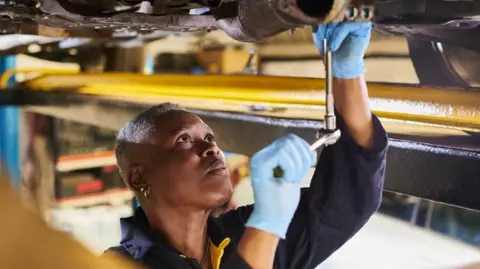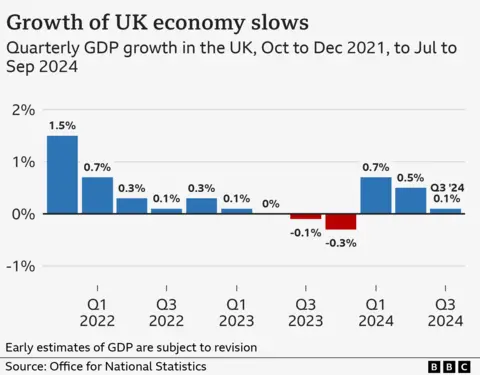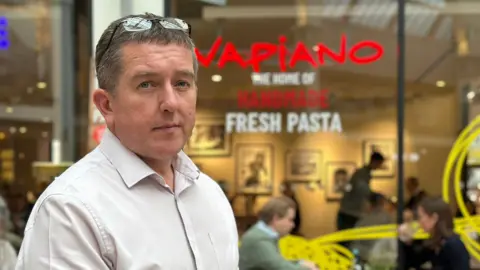UK economy barely grows with Budget fears blamed
 Getty Images
Getty ImagesThe UK economy barely grew between July and September, with uncertainty about the Budget being blamed for the weak growth.
The economy slowed over the three-month period, growing by just 0.1%, and shrank during September itself.
Labour made boosting economic growth its top priority when it came into power but Chancellor Rachel Reeves said she was "not satisfied" with these latest figures which cover the first three months of the new government.
However, many businesses have criticised tax rises in the Budget which they say will lead to higher prices and fewer new jobs.
Major companies, including Marks & Spencer, Sainsbury's and JD Sports have hinted they will increase prices because of the changes.
The latest growth figure was weaker than expected and was a sharp slowdown from the 0.5% growth seen in the April to June period.
A number of economists said concerns about what October's Budget would contain had affected how firms and households had behaved.
Ben Jones, lead economist at the CBI business group, said firms had widely reported "a slowdown in decision making" prior to the Budget. He added that once it had been announced it had "set off warning lights for business".
The increase in National Insurance Contributions for firms together with other measures such as the rise in the minimum wage "is expected to trigger a more cautious approach to pay, hiring and investment", Mr Jones said.

"The economy has a bit less momentum than we previously thought, and it’s striking that the economy has only grown in two of the past six months," said Ruth Gregory, deputy chief UK economist at Capital Economics.
However, she added "this doesn’t mean the UK is on the cusp of another recession".
When the economy is growing steadily, people tend to spend more, extra jobs are created, more tax is paid and workers get better pay rises.
'It felt like people were holding back'

Andy Crisp, manager of pasta and pizza restaurant Vapiano in Manchester, said he had noticed a slight slowdown in the run up to Reeves' Budget.
The summer was “a game of two halves”, he said, which finished quite strongly with sales up between 2-3% from a year ago.
However, the week before the Budget he “did see a downturn” in footfall.
“The only thing we could potentially put that down to was it felt like there was a nervousness prior to the Budget coming out as to ‘what does it mean to me? What does it mean to the general public?’
"So it almost felt like people were holding back to find out what the end result was going to be.”
Speaking to the BBC, the chancellor said growth was the "number one mission" of the government, and she wanted "growth to be stronger and to be felt by families across the United Kingdom".
Reeves had been accused of talking down the economy ahead of the Budget, but asked if her comments had affected spirits, she said: “We’ve had barely any growth in the UK economy for more than a decade now.”
Shadow chancellor Mel Stride said growth had now "slowed significantly" due to Labour's policies.
“Labour made a lot of promises about growth in the election, they need to act now before their broken promises lead to yet more tax rises."
Liberal Democrat Treasury spokesperson Daisy Cooper called the growth figures "disappointing", adding tax rises announced in the Budget "could be the final nail in the coffin for the many small businesses that are already struggling".
The government wants the UK to be the fastest growing economy among the G7 group of rich nations.
For the July to September period, the UK currently ranks fifth in the G7, behind the US, France Germany and Japan, but above Italy. Canada has yet to publish its growth figure.
The Office for National Statistics (ONS) said growth in the UK was "subdued across most industries" in the latest quarter.
One big factor was the slowdown in the services sector - which dominates the UK economy and covers businesses such as shops, bars and restaurants.
The sector grew by just 0.1% over the three months, and saw no growth at all in September.
In October, Reeves presented what she called a "Budget for growth".
But the government's independent forecaster, the Office for Budget Responsibility, said the Budget would only “temporarily boost” the UK and the size of the economy would be "largely unchanged in five years" compared with its previous estimate.
The UK faces another potential challenge to growth if US President-elect Donald Trump goes ahead with plans to impose a blanket 20% tariff on all imports into the US.
Analysis by the University of Sussex's Centre for Inclusive Trade Policy has suggested such a move could hit UK exports by £22bn.
The chancellor told the BBC she was “looking forward to working closely” with Donald Trump but would “make the case for free and open trade which benefits both of our economies”.
